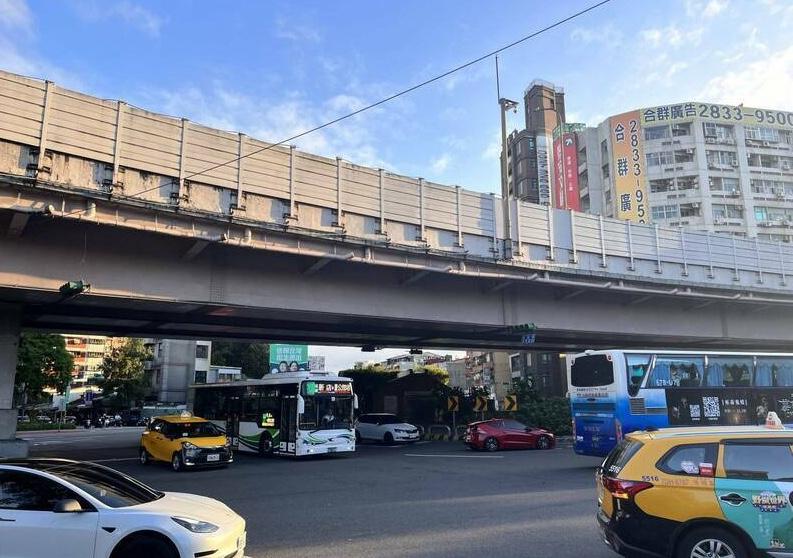The Gongguan Traffic Circle in Taipei is to be redesigned beginning on Sept. 13, marking an end to the city's most hazardous intersection, the Taipei City Government said today.
Taipei Mayor Chiang Wan-an (蔣萬安) in March announced that the traffic circle is to be demolished and the underpass filled in to create a traditional intersection.
The traffic circle that connects Keelung Road and Roosevelt Road in Zhongzheng District (中正) has been the city’s most hazardous intersection for seven consecutive years, city data showed.

Photo: Taipei Times
Work is expected to take 65 days, during which the roundabout would be converted from a seven-way junction to a standard four-way intersection with crosswalks, the Taipei Traffic Engineering Office said.
Buses would be rerouted from the underpass to a surface-level bus lane on Roosevelt Road, with services from Fuhe Bridge (福和橋) and Keelung Road using the new bus lane, it said.
The new planning, lane design and traffic control system are expected to reduce the risk of accidents by up to 63 percent, after the intersection ranked as the No. 1 spot for collisions for seven consecutive years, it said.
More than 70 percent of accidents occur due to collisions between vehicles traveling in the same direction, as the area is prone to overtaking, undertaking and weaving, the office said.
The changes would also shorten walking distances and reduce risk for pedestrians, it added.
Work was originally set to begin on June 28, but residents were concerned whether the Taipei City Government had adequately informed the public.
Residents also asked the government to conduct public surveys or a local referendum, while others called for the department to first improve road markings and traffic signals, although all requests were denied.
Expert reviews and international case studies showed that road markings would only improve safety by 5 to 12 percent due to the high traffic volume, high percentage of scooters and the unique design of the traffic circle, the office said.
Previous measures, such as marking guide lines on the road, failed to improve safety, it added.
Additional reporting by CNA

The Coast Guard Administration (CGA) yesterday said it had deployed patrol vessels to expel a China Coast Guard ship and a Chinese fishing boat near Pratas Island (Dongsha Island, 東沙群島) in the South China Sea. The China Coast Guard vessel was 28 nautical miles (52km) northeast of Pratas at 6:15am on Thursday, approaching the island’s restricted waters, which extend 24 nautical miles from its shoreline, the CGA’s Dongsha-Nansha Branch said in a statement. The Tainan, a 2,000-tonne cutter, was deployed by the CGA to shadow the Chinese ship, which left the area at 2:39pm on Friday, the statement said. At 6:31pm on Friday,

The Chinese People’s Liberation Army Navy’s (PLAN) third aircraft carrier, the Fujian, would pose a steep challenge to Taiwan’s ability to defend itself against a full-scale invasion, a defense expert said yesterday. Institute of National Defense and Security Research analyst Chieh Chung (揭仲) made the comment hours after the PLAN confirmed the carrier recently passed through the Taiwan Strait to conduct “scientific research tests and training missions” in the South China Sea. China has two carriers in operation — the Liaoning and the Shandong — with the Fujian undergoing sea trials. Although the PLAN needs time to train the Fujian’s air wing and

STRIKE: Some travel agencies in Taiwan said that they were aware of the situation in South Korea, and that group tours to the country were proceeding as planned A planned strike by airport personnel in South Korea has not affected group tours to the country from Taiwan, travel agencies said yesterday. They added that they were closely monitoring the situation. Personnel at 15 airports, including Seoul’s Incheon and Gimpo airports, are to go on strike. They announced at a news conference on Tuesday that the strike would begin on Friday next week and continue until the Mid-Autumn Festival next month. Some travel agencies in Taiwan, including Cola Tour, Lion Travel, SET Tour and ezTravel, said that they were aware of the situation in South Korea, and that group

Taiwanese celebrities Hank Chen (陳漢典) and Lulu Huang (黃路梓茵) announced yesterday that they are planning to marry. Huang announced and posted photos of their engagement to her social media pages yesterday morning, joking that the pair were not just doing marketing for a new show, but “really getting married.” “We’ve decided to spend all of our future happy and hilarious moments together,” she wrote. The announcement, which was later confirmed by the talent agency they share, appeared to come as a surprise even to those around them, with veteran TV host Jacky Wu (吳宗憲) saying he was “totally taken aback” by the news. Huang,